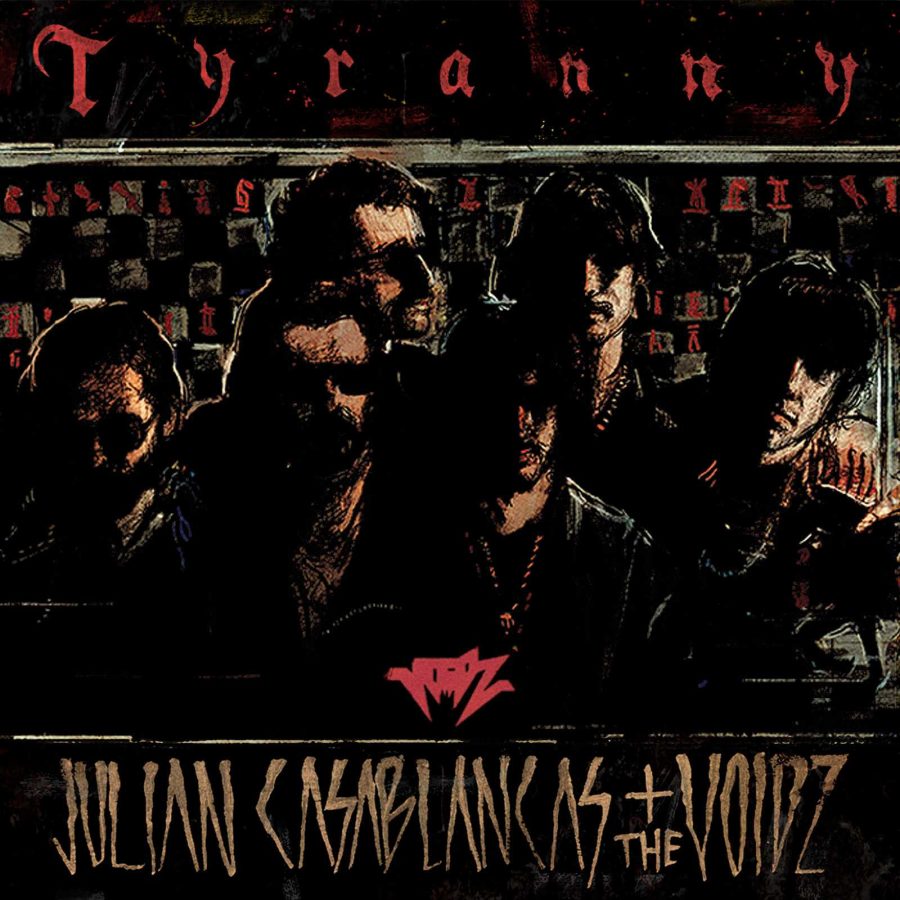If you had to describe pretty much anyone’s first impression when listening to the album Tyranny, it would be messy. Tyranny, released on September 23rd, is the latest album that is a result of Julian Casablancas’ side project work. Casablancas enlisted the help of Jeramy Gritter and Amir Yaghmai on guitar, Jacob Bercovici on bass guitar and synthesizers, Alex Carapetis on drums, and Jeff Kite on keys; altogether, they are dubbed “the Voidz.” One may think of Casablancas’ previous work from 2009, Phrazes for the Young – a beautiful and carefully constructed blend of delicately chosen keyboard sounds and guitar solos set alongside lyrics akin to deep self-reflective poetry – and compare it to Tyranny and wonder: how did Casablancas get so off track?
In actuality, that question could not be farther from the truth. While discordant, messy, eclectic and unsettling at times, Tyranny is some of Casablancas’ purest forms of artistic expression to date. A mash-up of instruments including keyboards, guitar solos, bass lines violins and drum beats, this album is radically different from anything Casablancas has ever produced before. It is unapologetically harsh and dark, deconstructed and random enough to isolate the listener yet mysterious and compelling enough to keep the listener trying to understand what the craziness means.
The tone of Tyranny is immediately set with the repetitive, metallic, harsh beat heard at the beginning of the first track, “Take Me in Your Army.” While the constant drum beat remains throughout, it is overruled by Casablancas’ light, almost robotic and distant-sounding vocals. It is chilling to the point that it alienates the listener right away – a somber tone that immediately lets the listener know this isn’t going to be like any of Casablancas’ past work.
The album picks up with “Crunch Punch” – riddled throughout with blank spaces, short stints of electric guitar solos and a constant keyboard beat more likely to be found in a retro video game – but really hits the peak of intensity with “M.utually A.ssured D.estruction,” or “M.A.D.”, a short 2:32 minute song that packs its punch. Heavy drum beats, fast guitar stints and an unforgivably strong sound prove its worth. The only other song on the album that matches its intensity is “Business Dog,” but those two songs are different enough in order to maintain non-repetitiveness. “M.A.D” is altogether more consistently heavy sounding and has a looming feel to it, while “Business Dog” is more driven by bursts of intensity, which is especially shown by Casablancas alternating between singing crude verses in his regular voice and screaming the chorus in an unintelligible mess.
Potentially the most beautifully complex and hardest song to fully grasp on the album is “Human Sadness.” At 10:57 minutes, this song subtly but surely transports the listener through the 5 stages of grief: denial, anger, bargaining, depression, and acceptance. Carefully constructed and full of heavy and unexpected punches that transition from one stage to another, it is a song that takes multiple listens to fully appreciate. Casablancas’ voice struggles to be heard against the constant stream of instruments in the background that alternate between heavy and light throughout the song, conveying the rush and change of emotions when someone is in grief. It is a song that reveals more and more about itself as you listen to it, and it is one of the most multi-layered examples of artistic expression on the album.
In tune with the way it all began, “Off to War…” allows for a somber and simple end to Tyranny. “I wait for the light to shine,” Casablancas repeats and croons slowly over a few strums of a guitar and white noise intermixed with faint piano keys. Haunting and empty, it is both calming and fear-evoking at the same time; a perfect way to describe Tyranny overall.
At the end of the day, Tyranny will not be the incredibly popular album that die-hard “Is This It” fans hope Casablancas will return to; it will not be played over and over by the mass population or be a hit on Billboard like most musicians dream of, but Casablancas has produced Tyranny like this for a reason. It is an album that is unreachable to most, incredibly hard to decipher and involves a lot of listens and thought before any meaning can even begin to come from the songs. Tyranny’s greatest fault, though, is also the source of its greatest strength; for those who put in the time and effort in order to understand Casablancas’ messages and wisdom, they are rewarded with one of the most talent-filled, original albums released in a long time.


